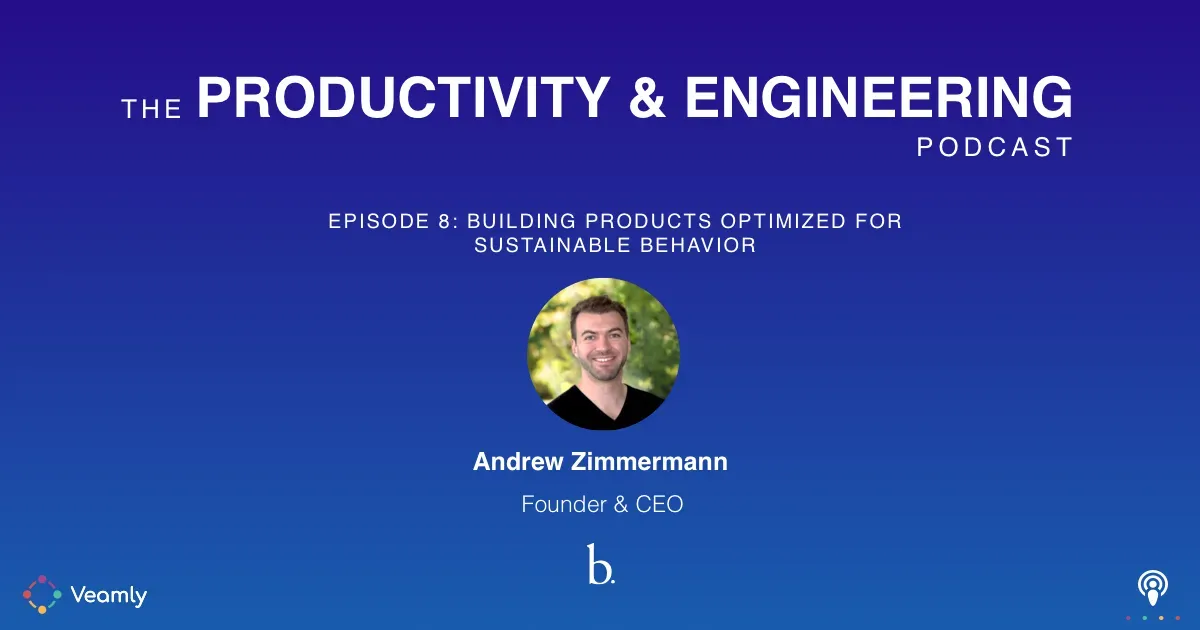
podcast
October 28, 2020Building Products Optimized for sustainable behavior
Over the last two decades, products have evolved and the technical barrier has become low. That meant it's not enough for your product to solve a problem, it has to generate a sustainable behaviour in the long run.
To cover this and more, our CEO Emna Ghariani sat down with Andrew Zimmermann to discuss the rise of persuasive technology and how that changed the way we build products.
Andrew is an expert in applied behavioral science. He is the founder and CEO of Behavior Design Collective a consulting firm that applies validated theories, models, methods, and frameworks from diverse fields of behavioral science to build products, programs and services that drive sustainable behavior change at scale. Andrew’s work focuses specifically on designing for behavior change for health, wellness, performance, and finance and led his first company (Play Present) to a successful acquisition by Lucid Performance. Current and past clients have included Google, Marriott International, Nike, USAA, Roche/Genentech and many others.
Persuasive Technology on demand
Almost every tech product we use every day has persuasive technology built in. But this has been in the making for 3 decades now. Andrew explains:
"Yeah, fortunately at Stanford technology has really built into the ecosystem and how things operate and even BJ's PhD thesis in the late 90s was on computers as persuasive technology. So as technology was devolving Stanford was a really innovative hub for those advancements and so is a front and center opportunity to think about that intersection between Tech and persuasion or behavior change and what that allowed us to do so is really ingrained into that ecosystem and it really makes sense. When we think about the the behavior models and things like that Tech is really a tool to facilitate Behavior change both positively and potentially negatively or as I like to say some unintended consequences. I don't know that we try to design things to that are harmful or hurtful in general."
Habit building products are the new standard
We live in an era where there is almost an app for everything. But this usually comes at a cost. He elaborates:
"Now, we have all these different word processing tools, you know, if you wanted to communicate with somebody you called them by phone you wrote them a letter or you saw them in person and you know with kind of the advancement of Technology now even in to call someone on phone you had to do it from a location of home phone business phone a pay phone and now we can call people so so we unlock this opportunity to communicate but there's a lot of unintended consequences that come with that.
You know, when we think about the Advent of email it really allowed asynchronous communication and documentation and storage of that information. It also created a lot of unintended consequences and as it evolved over time, you know, a lot of these early email platforms.
We're just business platforms that have evolved and kind of almost like overgrown into all areas of our life with nobody kind of pruning them designing them or thinking about those unintended consequences over time to where I think we are today where new products continue to come out or becoming more overwhelmed there.
They're designed and as you mentioned we're opted Into those notifications those prompts where opted into someone being able to connect with us if they have that information at any given time so, you know, whereas if I'm not at home and somebody calls me they have to leave me a voicemail on my voicemail box.
You know, they can't reach me when I'm at dinner with my family out in a restaurant, you know email now, we have laptops and cell phones that can email before it was if you're at work you log into your computer and you can then re dream. While you're at the office not when you go home and now we're constantly connected and we haven't evolved the technology."
Listen to the full episode with our CEO Emna Ghariani on your favorite podcast platform.
Thank you for the registration
You are now subscribed to our newsletter